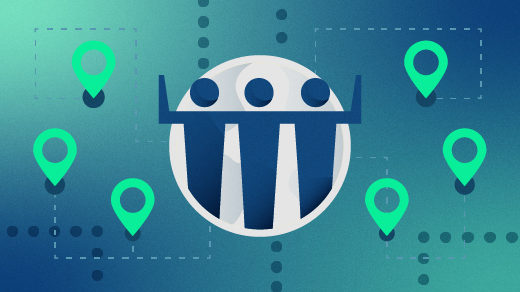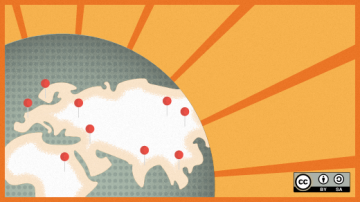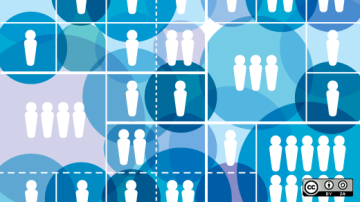I read Jeremy Rifkin's book The Zero Marginal Cost Society: The Internet of Things, the Collaborative Commons, and the Eclipse of Capitalism, which has a strong connection to open organization principles, particularly community building. Rifkin also writes about the future of green energy generation and energy use in logistics. In the previous articles in this series, I wrote about the communication internet being joined by the advancement of the energy (producing, sharing, consuming) internet. In this final part of the series, I look at Rifkin's thoughts regarding logistics (moving, storing, sharing) internet, and other economic sectors.
There are public transportation systems like roads, commuter trains, light rail, and buses that are supported by taxes. There are also private transportation options such as private ocean shipping companies, private cars, bicycles, and walking. All these modes of transportation will go through changes with an IoT standardized system that communicates with many moving vehicles. This will make movement of both people and goods more efficient (less waste and more full utilization of capacity). Established protocols will allow firms to collaborate with each other to a more detailed degree. Furthermore, inventory storage will become more efficient. Redundancies and inefficiencies will be identified and reduced.
This can be achieved by a distributed, collaborative, laterally scaled internet communication system, with its open system configuration and commons-style management, as a model for radically transforming global logistics.
Standardization required
Physical products need to be embedded in standardized modular containers that can be transported across all the logistics networks. The containers need to be equipped with standardized-protocol smart tags and sensors for identification and sorting.
Open supply network and cooperatives required
Currently, private firms have limited internal warehouses and distribution centers, limiting their ability to store and move goods efficiently. Suppose they are on an open supply web that's essentially everywhere and managed by sophisticated analytics and algorithms. In that case, they can store items and route goods more efficiently at any given moment in time.
Furthermore, as 3D printing advances, firms can transport the code for products instead of the physical item itself, reducing a great deal of goods movement and storage. What is needed are universal standards and protocols and a business model similar to a cooperative that is managed regionally, continentally and globally throughout the logistics system on roads, rails, waterways, and air travel. This logistics system will be part of smart cities, smart regions, smart continents and a smart planet.
All of the above requires a great deal of social capital over financial capital if it is to scale laterally rather than vertically. That is where developing commons management systems is a critical requirement.
From ownership to sharing
Rifkin states and feels the desire and need for individually owned automobiles is declining and will continue to decline in the years ahead. The biggest reason is its utilization rate, which might be 5%. Cars sit unused most of the day. Also, the younger generation has more of a sharing mindset over a single owner, exclusive owner mindset. These youths like a diversity of one's experiences over a wide network of various communities.
Looking forward, as car sharing expands, the need for vehicles on the road declines, and reduces carbon emissions. Rifkin thinks that once people start sharing cars, and sharing bicycles, that walking and public transportation will grow. In addition, solar-powered bicycles are coming on the market, increasing their potential and ease of use. Many of the IT-based public bike-sharing operations are run by non-profit organizations.
Car sharing will expand even more when driverless vehicles become available in more and more communities. They will be safer, as they don't get distracted, intoxicated or fall asleep at the wheel, which will drive down auto insurance. These vehicles should be readily available in 8 to 10 years.
Rifkin forecasts that having access to many things will force companies to move away from just selling things and move toward a wide range of solutions for the user. "Collaborative consumption" is on the move now. Sharing will begin with automobiles, bicycles, homes, clothes, tools, toys, and skills within a networked community. People are learning that going into debt just to have things doesn't create happiness, but experiences do. His belief is that society will move from out of control consumption to a sharing, interacting economy. All this will lead to a dependence on social capital and trust over an anonymous market to buy and sell in.
Even recycling is getting into the sharing economy. Why throw it away when others might like to use an item that still has life in it? This is particularly true for children's clothes, as they grow out of their clothes so quickly, and computers, which can be revitalized with a lightweight Linux distribution.
The Economy of Abundance
When products and services become very close to being free, the capitalistic system of making a profit breaks down. The motivation to provide goods and services has to be redirected or nothing will be provided.
Rifkin wrote, "Free implies free in two senses of the term: free in price and free from scarcity…Exchange value becomes useless because everyone can secure much of what they need without having to pay for it."
We have all heard the expression, "It's better to give than receive." Well, that's doubly true if you have so much of something that you can't use, spend, or consume it over your lifetime. Most people would rather give something to someone that could fully use it than just throw it away or keep it. The only issue remains is where to give it away that would produce the greatest good, and how to efficiently and effortlessly find the person that needs it?
Some people who have more food than they need mistakenly overconsume. This leads to diabetes, cancers, heart disease, and stroke. That could be true for anything, not just eating. Therefore, wise consumption is important and wise donations will result in a far healthier life. The World Happiness Report is a writing on generosity as an indication of wellbeing. With those thoughts in mind, sharing and donations have their own social capital.
Rifkin writes, "As the poor are lifted out of poverty, they begin to experience happiness. Each advance in income, wealth, and security makes them happier. But here's where it becomes surprising. When individuals reach an income level that provides the basic comforts and securities of life, their level of happiness begins to plateau (in the United States, one study puts it at an income of US $200,000 a year). Additional increases in wealth, and accompanying consumption, triggers diminishing marginal returns in overall happiness, until a point is reached, after which happiness actually reverses course and individuals become less happy."
Individuals in that situation notice superficial behavior from others and seem to be valued only by what can be gained in a material sense. This level of happiness can be seen in nations with a very unbalanced income distribution level. The opposite is true in countries with low income gaps.
Many studies have shown that strict materialist values are connected to depression and substance abuse. Conversely, it is our support and connections with other people that bring us the greatest joy.
The old expression "you can't take it with you" may be true for material things, but humans take joy from interacting with other people. Humans are all social creatures, and their interaction and empathy with others not only bring them joy, but health as well. They are more "other" oriented and feel the warmth of being a "giver".
Imagine this scenario. You visit a museum across town, and you notice that your neighbor is also there. You drove to the museum in your car, and your neighbor arrived by public bus. Because you live next to each other, you offer your neighbor a ride home. Would you consider asking him to pay you for the ride? Of course not. This is true for photographs we share. We don't ask to be paid for sharing a photo. The reason is the social value of offering a ride or a photo is far greater than a financial reward. With abundance and excesses coming in electricity and many other things once not fully available, that level of sharing for free will grow, particularly with people around us that we know personally. This is why the sharing economy is growing, and people are not expecting to exchange something to get financial value or added status.
Rifkin writes that more people are "far more interested in the use value of material things than their exchange value or status. A sharing economy of collaborative prosumers is, by its very nature, a more empathic and less materialistic one." He mentions, "two governing assumptions of economics: that the things we want most in life are scarce, and that our wants are unlimited. In reality, the things we want most are not scarce but infinitely abundant — love, acceptance, and recognition of our humanity."
When abundance replaces scarcity, people are more likely to have less drive to overly consume in fear of what tomorrow might bring. All this will lead to a strong sharing economy in which there is less materialism and more sustainability, less expedient measures, and more empathy. People will think and live more globally in communities and less in capitalistic markets. There will be a great move toward education and learning and less on just getting by.
Looking into the future through peer-to-peer reputation, trust and respect
According to Rifkin, peer-to-peer reviews and recommendations on on-line shopping websites are more trusted than TV celebrity endorsements. He thinks this will be true in building collaborative commons as well. We could call it mass word of mouth advertising.
Mankind has moved from mythological consciousness (tribal empathy, mythology), to theological consciousness (religious empathy), to ideological consciousness (national and political empathy), and finally to psychological consciousness (global empathy within specialties, global values).
An open organization community
In these articles, I showed that a new supply network and cooperatives will come back in importance, as it was hundreds of years ago. Also, I presented that the sharing and access of things needed will be more important than ownership. Lastly, far more abundant goods will come off the selling market, like photograph film and telephone services.
With these thoughts in mind, looking into the future, through peer-to-peer reputation, trust and respect will become increasingly important. Also, the contributions of all three sectors (government, the social economy of the commons, and the market) will continue in a hybrid form, although by mid-century, the collaborative commons sector is likely to define much of economic life in society.
Along the way, our ability to empathize with a wide range of people within the global community will be the result. This is what Rifkin calls the "collaborative age", when we all become part of the open organization community. Our wellbeing will be impacted and be influenced by ever larger global communities.








1 Comment